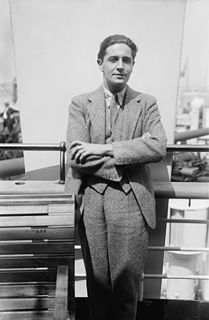A Quote by Thomas Huxley
Creation,' in the ordinary sense of the word, is perfectly conceivable. I find no difficulty in conceiving that, at some former period, this universe was not in existence, and that it made its appearance in six days (or instantaneously, if that is preferred), in consequence of the volition of some preexisting Being.
Related Quotes
Another source of conviction in the existence of God, connected with the reason and not with the feelings, impresses me as having much more weight. This follows from the extreme difficulty or rather impossibility of conceiving this immense and wonderful universe, including man with his capacity of looking far backwards and far into futurity, as the result of blind chance or necessity. When thus reflecting I feel compelled to look to a First Cause having an intelligent mind in some degree analogous to that of man; and I deserve to be called a Theist.
And some days, he went on, were days of hearing every trump and trill of the universe. Some days were good for tasting and some for touching. And some days were good for all the senses at once. This day now, he nodded, smelled as if a great and nameless orchard had grown up overnight beyond the hills to fill the entire visible land with its warm freshness. The air felt like rain, but there were no clouds.
The universe does not exist 'out there,' independent of us. We are inescapably involved in bringing about that which appears to be happening. We are not only observers. We are participators. In some strange sense, this is a participatory universe. Physics is no longer satisfied with insights only into particles, fields of force, into geometry, or even into time and space. Today we demand of physics some understanding of existence itself.
There is a certain sense in which I would say the universe has a purpose. It's not there just somehow by chance. Some people take the view that the universe is simply there and it runs along-it's a bit as though it just sort of computes, and we happen by accident to find ourselves in this thing. I don't think that's a very fruitful or helpful way of looking at the universe, I think that there is something much deeper about it, about its existence, which we have very little inkling of at the moment.
Some gentlemen have made an amazing figure in literature by general discontent with the universe as a trap of dulness into which their great souls have fallen by mistake; but the sense of a stupendous self and an insignificant world may have its consolations. Lydgate's discontent was much harder to bear; it was the sense that there was a grand existence in thought and effective action lying around him, while his self was being narrowed into the miserable isolation of egoistic fears, and vulgar anxieties for events that might allay such fears.
Do you see the slightest evidence anywhere in the universe that creation came to an end with the birth of man? Do you see the slightest evidence anywhere out there that man was the climax toward which creation had been straining from the beginning? ...Very far from it. The universe went on as before, the planet went on as before. Man's appearance caused no more stir than the appearance of jellyfish.
Yet some of my friends tell me they understand 50 percent of what my mother says. Some say they understand 80 to 90 percent. Some say they understand none of it, as if she were speaking pure Chinese. But to me, my mother's English is perfectly clear, perfectly natural. It's my mother tongue. Her language, as I hear it, is vivid, direct, full of observation and imagery. That was the language that helped shape the way I saw things, expressed things, made sense of the world
Religion is but a desperate attempt to find an escape from the truly dreadful situation in which we find ourselves. Here we are in this wholly fantastic universe with scarcely a clue as to whether our existence has any real significance. No wonder then that many people feel the need for some belief that gives them a sense of security, and no wonder that they become very angry with people like me who say that this is illusory.
Yet the most pervasive error one encounters in contemporary arguments about belief in God-especially, but not exclusively, on the atheist side-is the habit of conceiving of God simply as some very large object or agency within the universe, or perhaps alongside the universe, a being among other beings, who differs from all other beings in magnitude, power, and duration, but not ontologically, and who is related to the world more or less as a craftsman is related to an artifact.




































